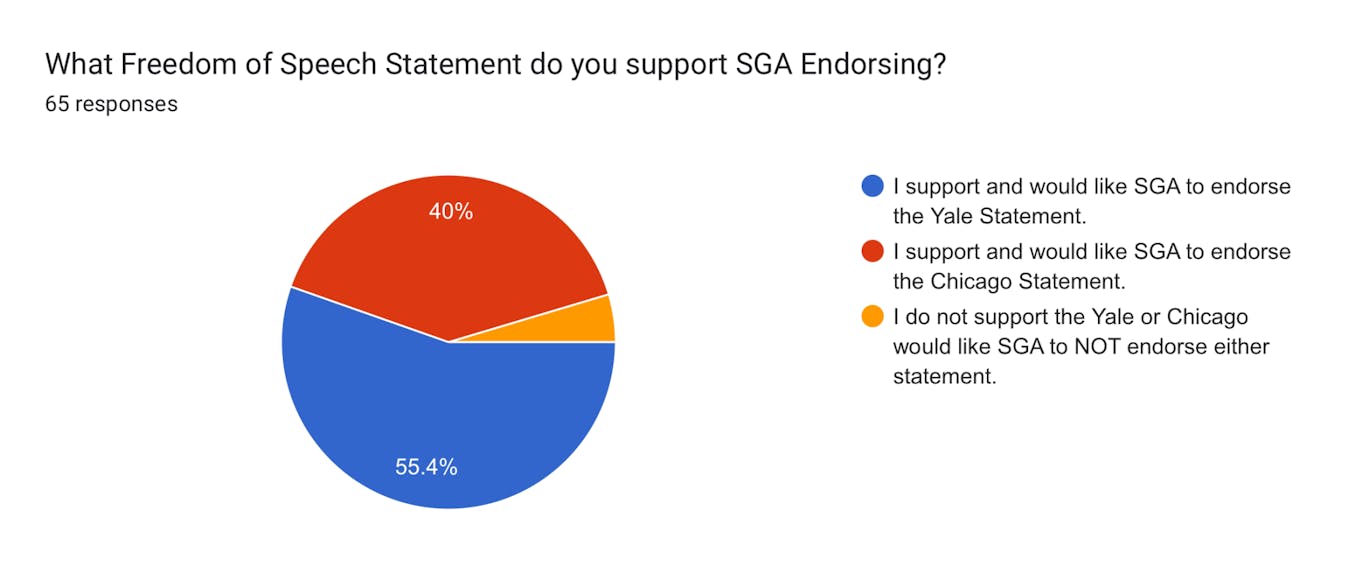SGA: Sustainability legislations passed, freedom of expression and diversity efforts

Two initiatives aimed at increasing sustainability and decreasing the amount of one-time-use "swag" items on campus received a boost, thanks to the Student Government Association House of Representatives Monday night.
'Joint Resolution 3: A Resolution to Support the Implementation of Student Sustainability at Central Michigan University' focuses on passing a "green fee," or a semesterly $5 sustainability fee that would apply to student accounts. This fee would fund sustainability initiatives on campus, such as solar panels, further composting initiatives and pest management.
The legislation says students would be notified of the fee via email weeks in advances and have the option to opt out. All of the money collected through the fee would be handled by a committee of seven students, who would communicate where the funds are going and provide reports through a website.
'Joint Resolution 4: A Resolution to Prohibit the Use of Central Michigan University Tuition Dollars for the Purchase of Merchandise with a Low Useful Life' aims to eliminate the distribution of one-time use items at university events. These one-time use items are sometimes referred to as "swag" items, and refer to things such as stickers and wristbands
Instead, the legislation opts for more sustainable items to be given out at these events that could be used more than once, and also given out at multiple future events as opposed to just one. This would be monitored through adding questions to existing event forms or creating new item approval forms.
The bills both passed unanimously through the Senate at the previous SGA meeting. The senate made one alteration to Joint Resolution 3 that allowed a Central Sustainability member to serve on the committee handling the sustainability fee funds before sending it to the House. The resolution also passed unanimously through the House.
Joint Resolution 4 passed through both the Senate and House without any alterations. The legislation passed unanimously through the Senate and received a vote of 37-0-8 in the House.
The proposals will be signed by SGA President Tyler Zimmerman before moving to university administration.
Continuing the freedom of expression conversation
At the SGA meeting last week, members from the Academic Senate ad-hoc committee came to discuss two freedom of expression statements they drafted inspired by existing statements at Yale University and the University of Chicago.
This week, university President Bob Davies and Academic Senate Chair Tracy Davis sought out student opinion on the two statements and endorse one so the information could be presented at the academic senate meeting on April 2.
Davies said that while the university has policies in place that currently link back to or discuss free speech, one currently doesn't exist that discusses freedom of expression. He cited the Academic Freedom Policy and Student Code of Conduct as examples.
"There are a lot of things there that relate to freedom of expression," he said. "But it doesn't set a culture, it doesn't set an overarching philosophy. ... One of our goals as a university is to be a marketplace of ideas. And being an open marketplace means allowing everybody to participate. To me, the overarching freedom of expression statement will enable us for that to occur."
Students shared their opinions on both statement drafts. Those who favored the Yale-inspired statement cited its clear definition of harassment, allowance of peaceful protests and clearly defining the "what, when, why and how" of freedom of expression.
Alternatively, some students spoke in favor of the Chicago-inspired statement because of its philosophical nature, brevity and open interpretation of freedom of expression.

SGA Vice President Ryan Biller then opened the floor to a vote between the two. Sixty-five students voted, with 35 in favor of the Yale statement and 26 in favor of the Chicago statement (the remaining four students chose neither). This information will be passed on to the Academic Senate meeting happening in the EHS French Auditorium at 3:30 p.m today.
Discussing the climate of diversity, equity and inclusion
Shawna Patterson-Stephens, the vice president of Diversity, Equity and Inclusion (DEI) came to SGA to ask how students feel DEI efforts are shown on campus or what improvements they believe should be made.
She said most of the questions were pulled directly from the 2022 climate survey her office put out. She said the result of that survey would be published later in the week, and that they were asking the questions tonight as a "temperature-check" of sorts.
"We thought it was really important to think about and ensure that the information (from the survey) is as relevant or current as possible," Patterson-Stephens said.
SGA members discussed a variety of things that made them feel welcomed and included on campus, such as caring professors,
Students were also vocal about things that made them feel unwelcome or excluded on campus, like safety concerns with older dorms and maintenance, feeling as if the university tackles issues performatively, not finding new solutions to the problems and the fear of reporting incidents that involve professors or those in CMU workplaces. One student, who asked not to be identified out of fear of retaliation, spoke about feeling "trapped" when it comes to discussing workplace issues at an on-campus job.
"Every campus job is intertwined," they said. "Any jeopardization of one employment opportunity can jeopardize other employment opportunities. ... If one supervisor just decides they hate you, it could lead to retaliation and you would have no grounds to have the instance documented."
Patterson-Stephens recorded students' comments on her laptop, and provided students with links to the work the DEI office has been doing. Students can read about the team that conducted the initial climate survey on the DEI webpage.



